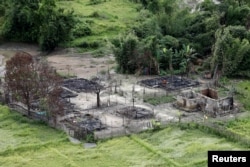U.S. lawmakers have proposed sanctions against Myanmar’s military over the treatment of the Rohingya ethnic group, as U.S. President Donald Trump leaves for a 12-day tour of east Asia in which he will meet with members of Myanmar's government at a regional summit.
The bipartisan legislation was introduced Thursday in the Senate, and Friday in the House of Representatives, both calling for renewal of trade and import restrictions on Myanmar, which is also known as Burma. The restrictions are meant as punishment for the military’s treatment of the Muslim Rohingya people in northern Myanmar's Rakhine state.
McCain, Engel speak out
Senator John McCain said the Senate’s legislation “would hold accountable the senior military officials responsible for the slaughter and displacement of innocent men, women, and children in Burma, and make clear the United States will not stand for these atrocities.”
Speaking for the House legislation, Representative Eliot Engel said lawmakers wanted to use sanctions to send a “clear message” to the Burmese leadership, both military and civilian. “This violence must stop, perpetrators must be held accountable, and there must be meaningful civilian control over Burma’s military and security forces,” Engel said.
A group of nearly 60 human rights organizations joined the discussion this week as well, releasing a letter Thursday directed at Secretary of State Rex Tillerson and Secretary of the Treasury Steven Mnuchin. In their letter, the groups noted that satellite images commissioned by independent organizations “show hundreds of burned villages — and tens of thousands of torched buildings.” It said refugees have provided first-hand accounts of Burmese soldiers setting fires, gang-raping women, and burning babies alive.
Call for restrictions, sanctions
The letter calls for the U.S. to impose sanctions under the JADE Act, which empowers the president to issue travel restrictions and financial sanctions against Burmese officials and their families if they are found to be engaged in “gross violations of human rights in Burma or in the commission of other human rights abuses.”
It also calls on the U.S. to levy travel restrictions and financial sanctions against individuals responsible for corruption and violations of internationally recognized human rights under the Global Magnitsky Act. The act targets people who commit human rights abuses against people who seek to “obtain, exercise, defend, or promote internationally recognized human rights and freedoms, such as the freedom of religion.”
The House and Senate bills also seek to prevent U.S. military assistance to Myanmar, where the Burmese military has taken the lead in the alleged human rights abuses.
In the Rohingya crisis, some 600,000 people have fled Myanmar for neighboring Bangladesh, which is now undergoing its own crisis as it seeks to accommodate all the Rohingya who fled their country.







